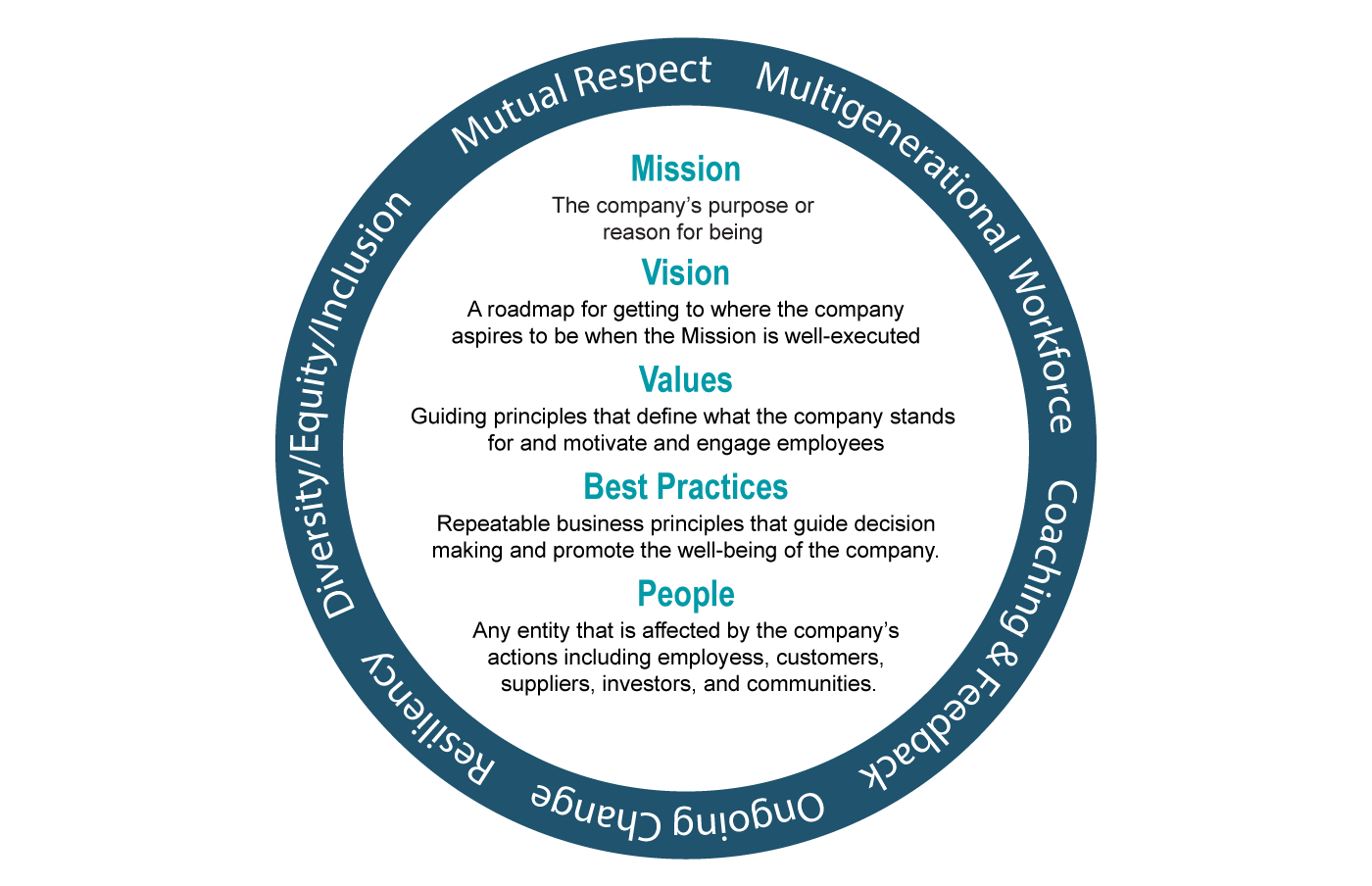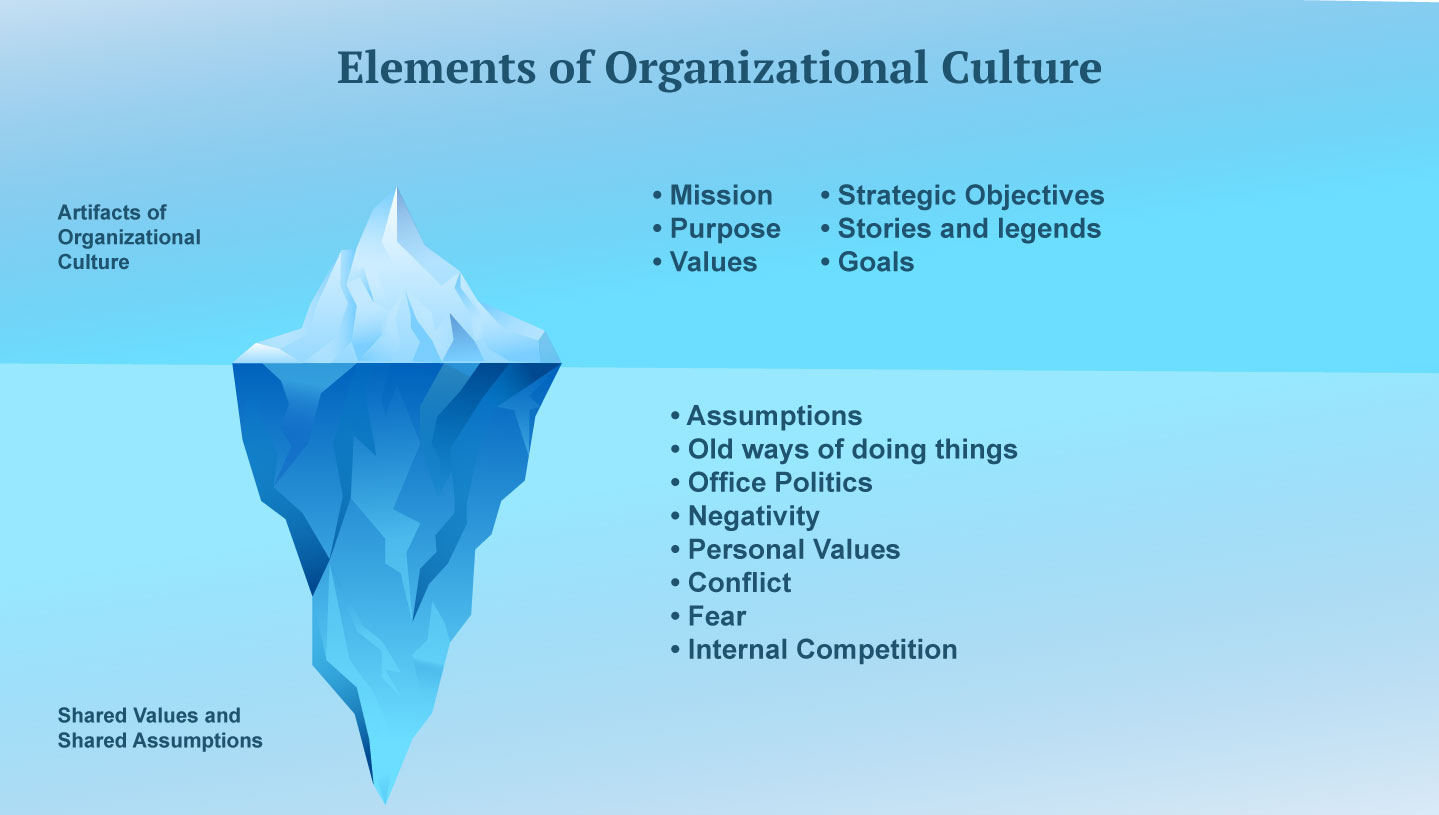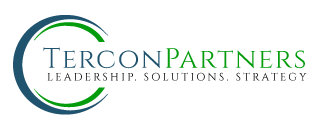

Let Us Help You Explore Your Company’s Cultural Iceberg
* TerconPartner’s Ten Question Business Culture Audit® provides a quick pulse check of employee attitudes, values and behaviors that are currently impacting company performance. Business Culture Consutant TerconPartners guarantees participant anonymity for all surveys we conduct.
* Key topics include Internal communications, Leadership Practices, Conflict Management and seven additional functions that drive organizational performance.
* Clients have the option to add two customized questions of their choosing. Call us at 1-888-233-4660 (Toll Free) or Email Us at info@terconpartners.com to schedule a FREE culture consultation to discuss how our customizable Business Culture Audit® will benefit your company.
TerconPartner’s Comment:
A company can’t control its competition, the pace of technical innovation, nor the overall economy. However, it can control the quality and vibrancy of its culture. Let us show you how.
Culture is a company’s personality
Culture defines the environment in which people work – the values, beliefs, behaviors, and underlying assumptions that drive every aspect of the organization’s activities. Culture exists in all organizations, whether it is created through careful design or it evolves organically over time.

COVID-19 put company cultures to the test!
Culture is how people behave when no one is looking. Managers at every level are a link in the leadership chain that connects culture to results. Investing time in nurturing and reinforcing a positive culture increases the company’s competitive advantages.
Let Us Help You Explore Your Company’s Cultural Iceberg
* TerconPartner’s Ten Question Business Culture Audit® provides a quick pulse check of employee attitudes, values and behaviors that are currently impacting company performance. TerconPartners guarantees participant anonymity for all surveys we conduct.
* Key topics include Internal communications, Leadership Practices, Conflict Management and seven additional functions that drive organizational performance.
* Clients have the option to add two customized questions of their choosing. Call us at 1-888-233-4660 (Toll Free) or Email Us at info@terconpartners.com to schedule a FREE culture consultation discuss how our customizable Business Culture Audit® will benefit your company.
The Power of an Organization’s Culture
Culture is a company’s personality
Culture defines the environment in which people work – the values, beliefs, behaviors, and underlying assumptions that drive every aspect of the organization’s activities. Culture exists in all organizations, whether it is created through careful design or it evolves organically over time.
TerconPartner’s Comment:
A company can’t control its competition, the pace of technical innovation, nor the overall economy. However, it can control the quality and vibrancy of its culture.

COVID-19 put company cultures to the test!
Culture is how people behave when no one is looking. Managers at every level are a link in the leadership chain that connects culture to results. Investing time in nurturing and reinforcing a positive culture increases the company’s competitive advantages.
Most Companies are facing two culture challenges today
Challenge # 1: How to refocus the workforce on the importance of “living the culture and company values” during and after periods of disruption, major change, and transition.
The Role of the CEO
CEO’s play a critical role in shaping their company’s culture and ensuring that the Mission, Vision, and Values are honored and protected – no matter what else is happening in the company or around the globe.
All company leaders must be “culture carriers”
On a day-to-day basis, leaders at all levels need to be culture carriers who model and reinforce the company’s culture. Three ways leaders can reinforce the power of culture:
1.) Share observations
Point out examples of company values and best practices they have observed or learned about that were implemented.
2.) Informal conversations
Talk with their teams about what it means to live the culture. For example, “One of our values is joint problem-solving. How are we doing with this and how can we find more opportunities for the company to benefit from this practice?”
3.) Culture building
Studies show that leaders foster higher engagement and commitment by supporting a culture based on mutual respect, encouraging collaboration, and creating a sense of “belongingness” on their teams.
Most Companies are facing two culture challenges today
Challenge # 1: How to refocus the workforce on the importance of “living the culture and company values” during and after periods of disruption, major change, and transition
The Role of the CEO
CEO’s play a critical role in shaping their company’s culture and ensuring that the Mission, Vision, and Values are honored and protected – no matter what else is happening in the company or around the globe.
All company leaders must be “culture carriers”
On a day-to-day basis, leaders at all levels need to be culture carriers who model and reinforce the company’s culture. Three ways leaders can reinforce the power of culture:
1.) Share observations
Point out examples of company values and best practices they have observed or learned about that were implemented.
2.) Informal conversations
Talk with their teams about what it means to live the culture. For example, “One of our values is joint problem solving. How are we doing with this and how can we find more opportunities for the company to benefit from this practice?”
3.) Culture building
Studies show that leaders foster higher engagement and commitment by supporting a culture based on mutual respect, encouraging collaboration, and creating a sense of “belongingness” on their teams.
“Most business leaders know the importance of organizational culture, but most don’t grasp what really defines their culture or how it connects to performance.”
– Deloitte
“Most business leaders know the importance of organizational culture, but most don’t grasp what really defines their culture or how it connects to performance.”
– Deloitte
Definition of Culture – “How we do things around here.”

Best Practice:
Here’s a technique some of our clients use to explore both what’s above and below the surface of the company’s culture. Periodically, an executive asks several employees (separately) this question: “What’s your experience like working in this organization today?” The question is broad enough to allow the responders to talk about any subject of importance to them. Anonymity is guaranteed. The executive then periodically sends an email broadly summarizing some of the positive comments and areas needing attention from management to all employees.

Three Ways a Positive Company Culture Strengthens Your Competitive Advantage
1.) It can play a major role in aligning employees with organizational goals and motivate them to work toward a shared company vision.
2.) It can be a magnet for attracting and retaining talent in a multigenerational workforce.
3.) Studies by Cisco and others confirm that positive corporate cultures drive better financial results.
Definition of Culture – “How we do things around here.”

Best Practice:
Here’s a technique some of our clients use to explore both what’s above and below the surface of the company’s culture. Periodically, an executive asks several employees (separately) this question: “What’s your experience like working in this organization today?” The question is broad enough to allow the responders to talk about any subject of importance to them. Anonymity is guaranteed. The executive then periodically sends an email broadly summarizing some of the positive comments and areas needing attention from management to all employees.

Three Ways a Positive Company Culture Strengthens Your Competitive Advantage
1.) It can play a major role in aligning employees with organizational goals and motivate them to work toward a shared company vision.
2.) It can be a magnet for attracting and retaining talent in a multigenerational workforce.
3.) Studies by Cisco and others confirm that positive corporate cultures drive better financial results.
Challenge # 2: What adjustments are needed to ensure a company’s culture is driving desired business results?
Following the seismic global crisis and a major restructuring of the work environment, many company executives are asking these four questions:
1.) What are the strengths of our current company culture? Will they help position us for success?
2.) Is leadership communicating the information people need to remain engaged and committed to the organization?
3.) Will our current culture help us attract and retain talent in the new, highly competitive marketplace?
4.) How can we maintain trust with our people as we transition into the new business environment?
Challenge # 2: What adjustments are needed to ensure a company’s culture is driving desired business results?
Following the seismic global crisis and a major restructuring of the work environment, many company executives are asking these four questions:
1.) What are the strengths of our current company culture? Will they help position us for success?
2.) Is leadership communicating the information people need to remain engaged and committed to the organization?
3.) Will our current culture help us attract and retain talent in the new, highly competitive marketplace?
4.) How can we maintain trust with our people as we transition into the new business environment?
Business Culture Audit
Since no one can know the duration or eventual outcomes of a crisis until it is over, we recommend taking steps to get answers to these four critical questions now by using TerconPartners’ Business Culture Audit®.
The Audit is a tool for taking the pulse of a company at major inflection points. Results help company leaders quickly obtain answers to two questions:
1. “Where are we today in terms of living our Culture? ”and 2. “What cultural adjustments are needed to meet our business goals and compete successfully for talent in the future.
Five benefits of the audit process:
1. ) Asking employees for their opinions motivates most people, as long as they believe the company will respond to the feedback.
2.) Prioritizing employee well-being and avoiding burnout are essential for a healthy company culture.
3.) When an “outside” organization collects and analyzes the data it ensures more honest responses than if it were an in-house initiative.
4.) Surveying communicates the company’s willingness to listen and respond to important cultural issues and issues related to management practices.
Business Culture Audit
Since no one can know the duration or eventual outcomes of a crisis until it is over, we recommend taking steps to get answers to these four critical questions now by using TerconPartners’ Business Culture Audit®.
The Audit is a tool for taking the pulse of a company at major inflection points. Results help company leaders quickly obtain answers to two questions:
1. “Where are we today in terms of living our Culture? ”and 2. “What cultural adjustments are needed to meet our business goals and compete successfully for talent in the future.
Five benefits of the audit process:
1. ) Asking employees for their opinions motivates most people, as long as they believe the company will respond to the feedback.
2.) Prioritizing employee well-being and avoiding burnout are essential for a healthy company culture.
3.) When an “outside” organization collects and analyzes the data it ensures more honest responses than if it were an in-house initiative.
4.) Surveying communicates the company’s willingness to listen and respond to important cultural issues and issues related to management practices.
Let Us Help You Explore Your Company’s Cultural Iceberg
* Tercon’s Ten Question Business Culture Audit® provides a quick pulse check of employee attitudes, values and behaviors that are currently impacting company performance. Tercon guarantees participant anonymity for all surveys we conduct.
* Key topics include Internal communications, Leadership Practices, Conflict Management and seven additional functions that drive organizational performance.
* Clients have the option to add two customized questions of their choosing. Contact us at info@terconpartners.com to discuss how our customizable Business Culture Audit® will benefit your company.







